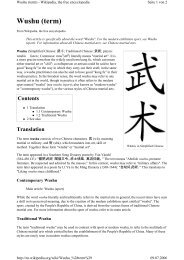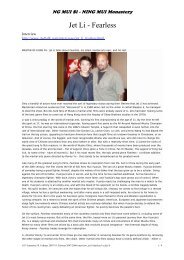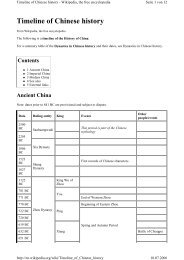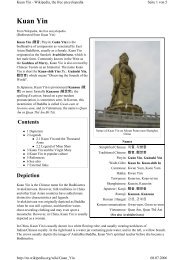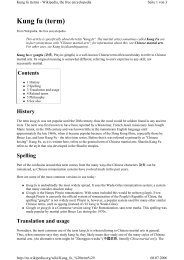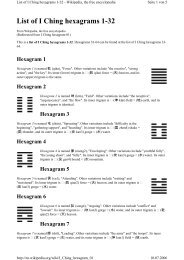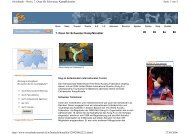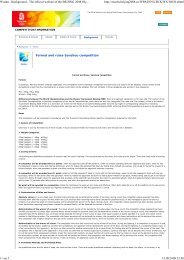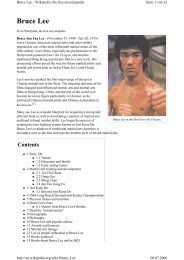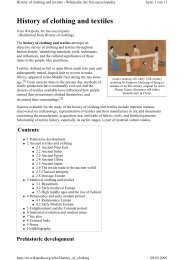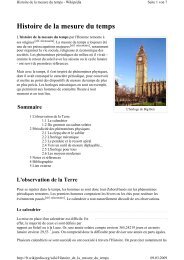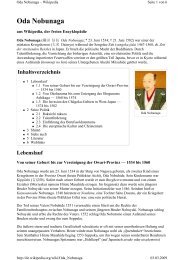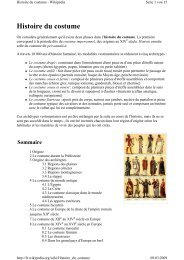Yiquan - Ning Mui Kung Fu Organisation
Yiquan - Ning Mui Kung Fu Organisation
Yiquan - Ning Mui Kung Fu Organisation
Create successful ePaper yourself
Turn your PDF publications into a flip-book with our unique Google optimized e-Paper software.
<strong>Yiquan</strong> - Wikipedia, the free encyclopedia<br />
<strong>Yiquan</strong><br />
From Wikipedia, the free encyclopedia<br />
<strong>Yiquan</strong> (Chinese:意拳; pinyin: Yìquán; Wade-Giles: I 4 Ch'üan 2 ; lit. "Mind Boxing"), also known as<br />
dachengquan (大成拳) (Wade-Giles: Ta Ch'en Ch'uan; lit. "Great Achievement Boxing"), is a martial art<br />
system which was founded by the famous Chinese xingyiquan master, Wang Xiangzhai (王薌齋). Having<br />
learnt xingyiquan in his childhood, Wang Xiangzhai became a skilled fighter, who spent years travelling all<br />
over China, meeting and comparing skills with masters of various styles of kung fu. In the middle of the<br />
1920s, he came to the conclusion that xingyiquan too often was taught wrong, with too much emphasis on<br />
'outer form', neglecting the essence of true martial power. And so he worked to return to what he felt was the<br />
true essence of the art using a different name, without the 'xing' (meaning form), and began teaching and<br />
practicing it accordingly. Unlike most other martial arts, yiquan is essentially formless, containing no fixed<br />
sets of fighting movements or techniques. Instead, focus is put on developing ones natural movement and<br />
fighting abilities through a system of training methods and concepts, working to improve the perception of<br />
one's body, its movement, and of force. Another thing that sets yiquan apart from other eastern martial arts, is<br />
that traditional concepts, like qi, meridians, dan tien etc. eventually were discarded to make place for new<br />
explanations and ideas rooted in Western science, medicine and psychology. Much of this came about due to<br />
one of Wang Xiangzhai's key philosophies, which was that yiquan was a science of martial arts, and that there<br />
always would be room for improvement. If new methods or explanations are found that help produce better<br />
results faster, they should be adopted.<br />
In 1939 an invitation was published, by Wang, in a Beijing newspaper for all martial arts masters to come and<br />
exchange experiences and ideas, which usually ended up in comparing skills. If anyone was to fight with<br />
Wang, though, they would first have to defeat one of four students he had appointed to fight for him, which no<br />
one who answered the challenge did.<br />
<strong>Yiquan</strong> seems to have been influenced by various other arts that Wang was exposed to, include <strong>Fu</strong>jian hèquán<br />
and bāguàzhǎng,.<br />
Contents<br />
� 1 History<br />
� 2 Simple Overview<br />
� 3 Schools<br />
� 4 External links<br />
History<br />
by Wang Xuanjie (Translated by Chen Shengtao)<br />
DACHENGQUAN is a set of barehanded exercises for health-keeping and combat. It was developed by my<br />
instructor Wang Xiangzhai in Beijing in the 1940s. The following anecdotes about him will help you learn<br />
something more about Wang and his dachengquan.<br />
When Wang Xiangzhai created dachengquan half a century ago, wushu which was popular among the folk<br />
was not much to the original and had become a showpiece rather than a fitness exercise and combat skill. To<br />
preserve the quintessence of traditional Chinese wushu, there was every need for all martial artists to pay<br />
attention to the prevailing deviation and make concerted efforts for a renewal. His determined resolution<br />
strengthened as he saw the Japanese invaders beating their victims of occupation for fun in Beijing. “We are a<br />
great nation,” he said indignantly. “How can we put up with such insults?”<br />
Then, while absorbing strong points of various schools of wushu, he created a style of barehanded<br />
http://en.wikipedia.org/wiki/<strong>Yiquan</strong><br />
Seite 1 von 4<br />
08.07.2006
<strong>Yiquan</strong> - Wikipedia, the free encyclopedia<br />
exercises:dachengquan. To spread the newly emerging routine far and wide, Wang recruited a large number of<br />
youngsters and gavethem lessons personally. His aim to help boost the morale of the Chinese people and<br />
counter foreign pugilism. He issued a statement in a local newspaper and declared that he was ready to take<br />
on any rivals including those coming from foreign countries.<br />
Wang’s remark angered Kenichi Sawai, a Japanese martial artist then living in Beijing. Sawai was good at<br />
karate, swordplay and judo. In his eyes,Chinese wushu was only something like gymnastics, having little<br />
value in actual fights. So, one day, he went to call at Wang’s in the hope of showing off his prowess. When he<br />
saw Wang Xiangzhai, he found that the Chineseshadow boxer, a man of middle stature clad in long gown,<br />
looked very gentleand suave. He was very happy to meet with such a weakling, thinking that he would win<br />
without fail. After introducing himself and explaining why he had come, he produced a newspaper which<br />
carried Wang’s statement and tossed it on a table.<br />
“You are ready to have a dual fight, aren’t you?” asked the Japanese karate practitioner, his face wreathed in<br />
contemptuous smiles. “Yes, I am,”retorted my instructor. “I always mean what I have said. I would never<br />
refuse anyone who wants to compete with me. Foreign martial artists are especially welcome.” Hearing that,<br />
Sawai went out of the drawing room and stood in the courtyard waiting for a duel. Without any hesitation,<br />
Wangcame out with hands placed behind his back. Directing his strength to both hands through concentration,<br />
Sawai assumed a horse-riding stance and launched a sudden attack on Wang’s face with hands. Seeing this,<br />
my instructor, his left hand remaining still, extended his right forearm to parry Sawai’s hands. Then, with a<br />
slight exertion of strength, Wang threw the Japanese muscle man 10 feet away. Before realizing what had<br />
happened,Sawai was already Lying on the ground on his back.<br />
Not admitting defeat, Sawai wanted to have a swordplay contest with Wang because he was so skilled at it<br />
that he could cut an apple on the head of a man into two without hurting the head. Considering that Sawai<br />
should get an idea of what Chinese swordplay was, Wang agreed to have another contest. With a sword held<br />
overhead in his hands, Sawai delivered a hard blow atWang’s head. Wang stepped a bit to the right and<br />
wielded his sword to block the opposing sword. As the two swords clanked, Sawai was also thrown<br />
severalfeet away and flattened with his palms benumbed. (According to the son of Sawai, they did not fight<br />
with swords but with sticks.)<br />
Irreconciled, Sawai rose to his feet and pounced upon Wang with his sword towards the throat. This skill is<br />
very famous in Japanese swordplay, with which one can catch his rival off guard. However, Wang was so<br />
good at Chinese swordplay that it seemed as if he did not make use of eyes but sense only in a fight. Wang<br />
turned his body to the right slightly, leaving Sawai’s attack wide of the mark. In another instant, Wang<br />
pressed his sword againsthis opponent’s. Sawai tried hard to draw his sword back, only to no avail, since it<br />
was “pasted” fast to Wang’s at the guard of the hilt. When Wang mustered up his strength, Sawai was flung<br />
out and slammed against a nearby door which caved in as a result.<br />
Later on, Sawai engaged Wang in a qinna-something like judo- contest. By then, he was already a 5th dan<br />
judoka in Japan. However, he could never get hold of Wang by the sleeve or the front in competition, no<br />
matter how hardhe tried. Instead, he was grasped by Wang as soon as they came to grips.<br />
Then came an Italian boxer who had made a name for himself in West Europe. His surname was James. When<br />
he was on a tour in Beijing, he learned that Wang Xiangzhai, founder of dachengquan, was looking for a rival,<br />
so he was also eager to have a try believing that it was a good chance for him to earn fame in China.<br />
After exchanging a few words at Wang’s, they came out into the courtyard and began to warm up for<br />
competition.<br />
Seite 2 von 4<br />
James, with shorts only on, put on a pair of gloves and gave several straight punches to a thick tree and<br />
leavesfluttered down from the swaying branches. When James took off his boxinggloves and changed into a<br />
pair of cotton-yarn ones and assumed a boxer’sclassic stance, the onlookers on the scene held their breath.<br />
The alien contestant appeared so powerful, so muscular and so agile, and he dwarfed Wang by a head. Could<br />
Wang be his match? Looking as calm as ever before,Wang was all geared for the contest, with his right hand<br />
http://en.wikipedia.org/wiki/<strong>Yiquan</strong><br />
08.07.2006
<strong>Yiquan</strong> - Wikipedia, the free encyclopedia<br />
in front of the chest.James was an experienced boxer endowed with long and powerful arms and highly<br />
proficient in the art. With his right hand in front and left hand at his lower jaw, he suddenly delivered a<br />
straight left to Wang’s face. As James came up with his fist, Wang raised his right forearm for a parry and in<br />
quick succession made a powerful push that shot James up and landed him six feet off. Without knowing what<br />
it was all about, James rose to his feetand composed himself for another bout. This time, he changed tactics.<br />
He first made an arm feint and then gave his chest a right uppercut. Turning slightly to the left, Wang put his<br />
right wrist gently on the right elbow ofJames, who felt benumbed all over at once, and collapsed on the<br />
ground after tottering for a moment.<br />
Now, he realized that he was not as good at fighting skills as Wang, which should account for his previous<br />
defeats. However, he thought he could out-play his rival in the third bout; he believed that he was much more<br />
powerful than Wang. To show this Italian boxer what Chinese boxing wasreally like, Wang asked James to<br />
punch his chest and ribs. A hail of hardblows followed and Wang was as firm as a rock. Getting desperate,<br />
James gathered all his strength and landed a heavy punch on Wang’s abdomen with his right hand. Wang’s<br />
abdomen heaved a bit and James fell down onto theground with his right wrist sprained.<br />
Later, a Mongolian wrestler, who had been living in the suburbs of Beijing, came to compete with Wang<br />
Xiangzhai. This story sounds quite incredible, but it has been on the lips of martial artists to date. Named<br />
Bator, this lad was a son of a former official in charge of military affairs in the Qing Dynasty (1644-1911).<br />
Bator began to learn xingyiquan (form-and-will shadowboxing) from his father at the age of 14 and took a<br />
fancy to archery and horsemanship four years later.When he was 20 years old, he started to practice wrestling<br />
under the guidance of a former imperial court trainer. After five or six years of training, he made rapid<br />
progress and became quite versed in wrestling. He was strong enough that he could subdue a gallopinghorse.<br />
One day on his way home, a shying horse ran up to him, pursued by a yelling crowd. When the horse arrived<br />
in front of him, this Mongolian wrestler first moved aside, then, to the great surprise of the pursuers,jumped<br />
forth to catch the horse by the neck and upset it.<br />
When he heard that Wang Xiangzhai was willing to have contests with other wushu devotees, Bator went into<br />
the city to rise to the challenge. At the start of the contest in Wang’s courtyard, the two stood a few meters<br />
apart, face to face. Bator moved forward, trying to throw Wang down with a unique skill he had mastered in<br />
wrestling training. As they were about to come intocontact, a small insect buzzed into Wang’s left ear.<br />
Disturbed as he was,Wang continued with his firm steps forward while picking his ear with hisleft little<br />
finger. At the sight of this, Bator jumped out of the way and,bowing to Wang with his hands folded in front,<br />
said: “You are so good at martial arts. I am no match for you.” The two exchanged a smile out of their tacit<br />
understanding for each other and the contest thus ended. The onlookers were all amazed. One of them asked<br />
Bator, “How come you acknowledged defeat? You should have had a try for it.” “As an old saying goes, a<br />
masterknows what a man he is fighting against the moment he takes the opponent on. He was so sedate and<br />
self- assured at this juncture that he could afford to pick his ear. If he was not an adept in the art, how could he<br />
have so much confidence in winning the contest?”<br />
In the year he developed dachengquan, Wang Xiangzhai kept having contests with dozens of martial artists,<br />
Chinese and foreign. They all came in confidence, but went in failure. Since then, the name of Wang<br />
Xiangzhai has spread far and wide and dachengquan become a beautiful blossom in the flower garden of<br />
Chinese wushu.<br />
Reference: Martial Arts of China Vol. 1, No. 7 , Page 297<br />
Simple Overview<br />
The actual training in yiquan can generally be divided into:<br />
Seite 3 von 4<br />
� Zhan zhuang (站樁) - Motionless postures, where emphasis is put on relaxation, working to improve<br />
perception of the body and on developing Hunyuan Li, or "all round force". Zhan zhuang can also be<br />
divided into two different types of postures; health postures and combat postures.<br />
http://en.wikipedia.org/wiki/<strong>Yiquan</strong><br />
08.07.2006
<strong>Yiquan</strong> - Wikipedia, the free encyclopedia<br />
� Shi li (試力) - Slow moving exercises, trying to bring the sensations developed through zhan zhuang<br />
into movements.<br />
� Moca bu (摩擦步) - Shi li for the legs.<br />
� Fa li (發力) - Exercises that teach the use of explosive force.<br />
� Tui shou (推手) - (Pushing hands) Shi li with a partner.<br />
� San shou (散手) - Free fighting practice. (Not to be confused with San Da)<br />
� Duan shou (斷手) - Fighting techniques, including strikes and kicks.<br />
Schools<br />
Two of the foremost people teaching modern yiquan are Yao Chengguang (姚承光) and Yao Chengrong (姚<br />
承榮), twin sons of Yao Zongxun (姚宗勛), whom Wang Xiangzhai appointed to be his successor. Others<br />
include Cui Ruibin of Beijing, students of the late Wang Xuanjie, and many more. A variant of the style,<br />
called Taikiken, is also practiced in Japan, by students and grandstudents of the late Sawai Ken'ichi, who<br />
learned yiquan in China.<br />
External links<br />
� Beijing Institute of <strong>Yiquan</strong> (http://www.yiquan.com/v3/en/index.htm)<br />
� I Chuan in Portland,OR (http://i-chuan.net/)<br />
� <strong>Yiquan</strong> Academy in Poland (http://www.yiquan.com.pl/engstart.html)<br />
� Da Cheng Quan in NYC (http://mysite.verizon.net/vze49wrn/index.html)<br />
� <strong>Yiquan</strong> in São Paulo, Brazil (http://www.chanzon.com/)<br />
� <strong>Yiquan</strong> in Brazil (http://www.i-chuan.com.br/)<br />
� <strong>Yiquan</strong> Online, Hyvinkää, Finland (http://www.tapmax.com/yq/)<br />
� Neigong.net (http://neigong.net/)<br />
Retrieved from "http://en.wikipedia.org/wiki/<strong>Yiquan</strong>"<br />
Category: Chinese martial arts<br />
http://en.wikipedia.org/wiki/<strong>Yiquan</strong><br />
Seite 4 von 4<br />
� This page was last modified 03:42, 19 June 2006.<br />
� All text is available under the terms of the GNU Free<br />
Documentation License. (See Copyrights for details.)<br />
Wikipedia® is a registered trademark of the Wikimedia<br />
Foundation, Inc.<br />
08.07.2006



